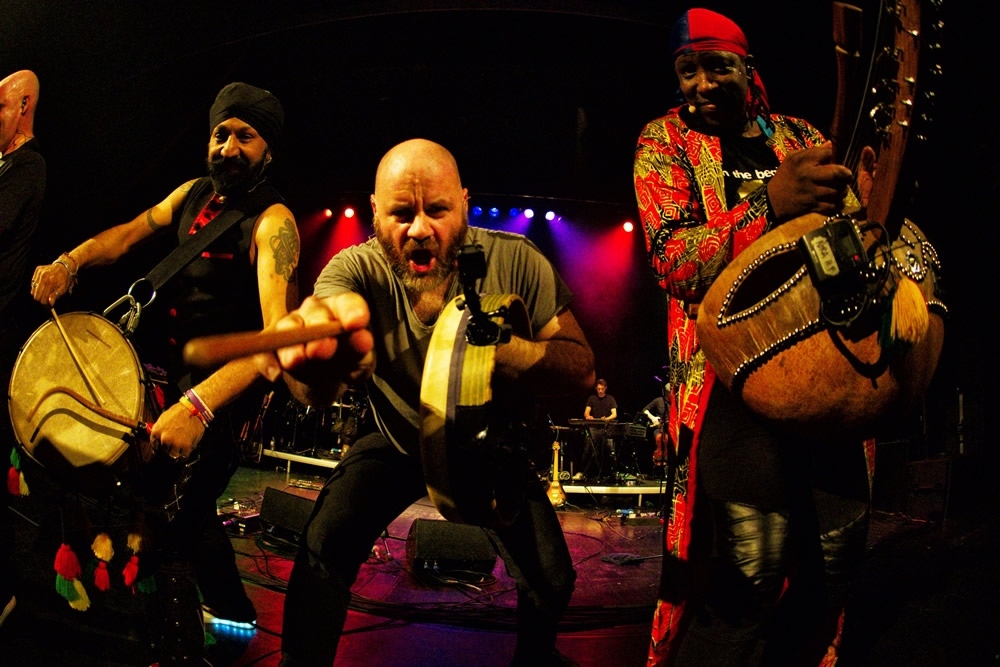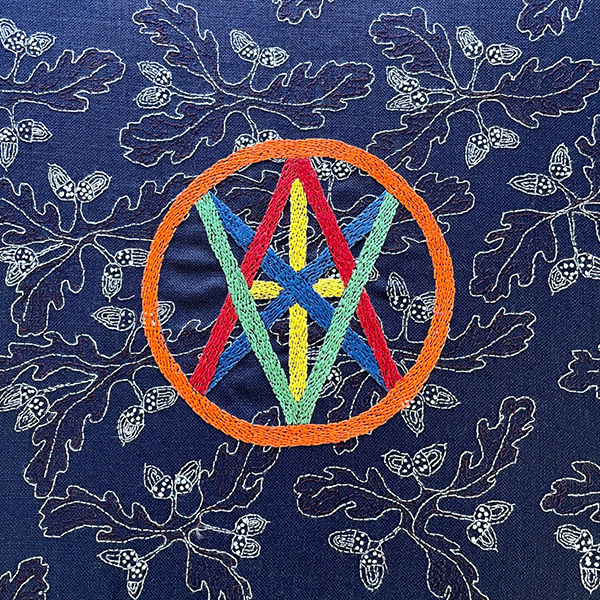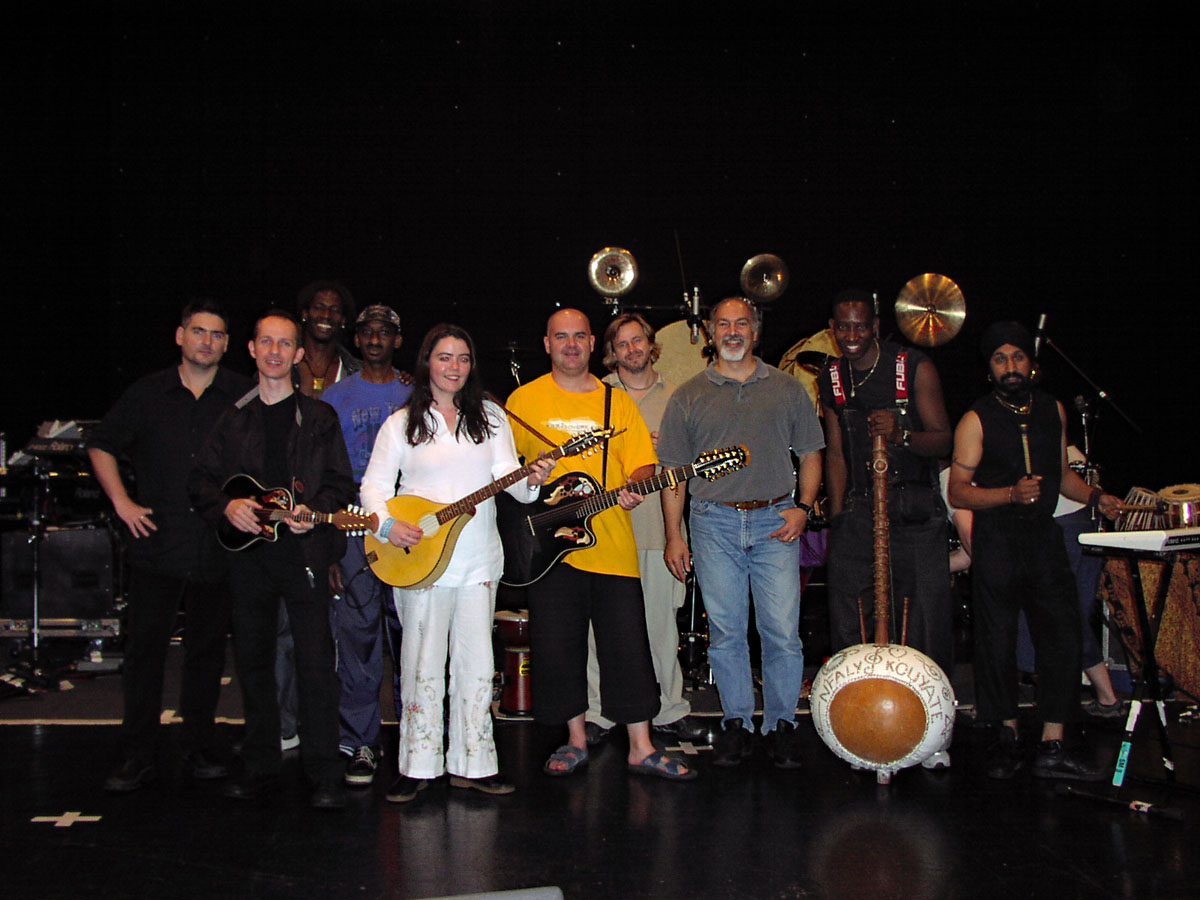By John Diliberto 11/30/2024

It’s been nearly 30 years since Afro Celt Sound System turned world fusion on its head with their debut album, Volume 1: Sound Magic . They fused Celtic, African, Indian and Middle Eastern music in a web of electronica grooves and atmospheres that was some of the most joyous music to hit the rave scene.
Afro Celt Sound System wasn’t supposed to last beyond that one recording, let alone eight albums. They were an ad hoc group, one of many that got together in spontaneous jam sessions at Peter Gabriel’s Real World Studios in the west of England. But the Afro Celts had something many of those assemblages didn’t, a man with a vision: Simon Emmerson.
The English-born Emmerson got the African bug when he worked with Senegalese singer and songwriter Baaba Maal. He heard a relationship between the singer’s often forlorn, African melodies and traditional Irish aires.
In 1995 Emmerson returned to England and brought some of Baaba Maal’s band with him to jam during a Real World Recording Week. Joining traditional and electronic musicians together in the countryside near Bath, this was the beginning of a nearly 30 year journey.
 Now they’ve released OVA, the first album since the death of Emmerson in early 2023. OVA was the last album he worked on and it may be their best since 2005’s Volume 5: Anatomic. The band split after that, with original members James McNally, Martin Russell and Iarla O’Lionaird going their different ways.
Now they’ve released OVA, the first album since the death of Emmerson in early 2023. OVA was the last album he worked on and it may be their best since 2005’s Volume 5: Anatomic. The band split after that, with original members James McNally, Martin Russell and Iarla O’Lionaird going their different ways.
The title OVA, is derived from the band’s logo, designed by the late graphic designer Jamie Reid, which in turn is derived from Ovates, a Druidic term for Ancient Celtic bards, prophets, and philosophers. ACSS has always been wrapped in mysticism.
With core members Emmerson, English-Indian Dhol percussionist Johnny Kalsi and Guinean kora player N’Faly Kouyate remaining, the last couple of Afro Celt albums have tilted toward a more traditional, rootsy, heavily African sound. But OVA marks a return to their earlier aesthetic, a move I believe is linked to the return of keyboard and programmer Simon “Mass” Massey, who co-produced the album. His keyboard atmospheres, and incredible rhythm programming, are what tie this album together.
You can hear that instantly in the opening track, “The Hawk Owl’s Lament.” As the longest track at 10 minutes, it almost serves as an overture to the album. Out of an electronic mist, multiple strings converge with guitar, cittern, kora and hammered dulcimer circling in a weave of kinetic moiré patterns. Acoustic percussion is joined by electronic grooves, and the classic Afro Celt sound emerges, as the track storms through a 21st century tribal stomp, with African chants and the occasional punctuating cries of an actual Hawk Owl.
The electronic side of the group had been sidelined on the last two Afro Celt albums, but it returns like a unifying victor, tying together the strands of Afro Celt’s whirligig. “The Hawk Owl’s Lament” is a journey that picks you up in space and drops you off in breathless meditation.
That mood continues in “The Mantra.” Originally conceived for one of the albums Emmerson produced for the Lush cosmetic company to use in their spas, this is a different take on chant. It’s a journey that begins in the melancholy of electric piano, but is uplifted by raga like violin from Ewen Henderson from the band Mànran. That sets up a wordless chant sung by Rioghnach Connelly, the soul of Afro Celts in their last several years (as well as the front-woman of the overlooked band, The Breath.) She begins lyric-free before dropping into a repeated mantra topped by her singing in Gaelic. The percussion will have you grooving in space as tablas, dhol and other drums converge on a Jah Wobble-like dub bass line. It ends with a yearning verse from Kouyate. What a trip.
“Magical Love” taps a funk sound Afro Celts have also been purveying in the last couple of releases. It’s a song of empowerment with vocals traded off between Connolly, in English, with Djekoria Fanta Condé and N’Faly Kouyaté in Fula. It’s partly a song of women’s empowerment and against arranged marriage. This should be a hit single with its repeated chorus and deep bass drops.
Some of the tunes track the African side more than others, like “N’Faly Foli.” It’s an ecstatic song that is Kouyate’s ode to water, sung in Fula. You can hear the art of electronic integration, as synth and programed drums lock in polyrhythmic sync with acoustic percussion.

Blast from the Past: Afro Celts second live Echoes appearance 2001.
That’s also the case with “Radio Ronza,” one of the centerpieces of the album, opening with balaphon, the Malian version of a marimba, merging with a squelchy synth rhythm. This is a groove track that seems to turn corners every few minutes into a new sound. Buzzing synth bass, African choirs, djembes, dhols and balaphon dance, while an Irish fiddle spins a reel over the top. At various times, Irish flute darts over a tribal percussion groove, backed by fuzzed bass synthesizer. Chants drop in that are original recordings, but are turned into samples that are triggered into the rhythms. “The Lockdown Reel” with double tracked violin spinning out an Irish reel, has roots in EDM with its electronic groove accented by the acoustic percussionists and punctuated by Kouyaté’s cries of ‘Kharifa!’ (Entrust). This is world fusion trance at its most virtuosic.
Some of their music can be more ballad-like and languid. “La Paix” is a gentle, swaying song on which Griogair Labhruidh sings both wordlessly and in French. It features some incisive fiddle and a vocal choir, in a sound that could be a samba, then at some point the vocals turn Gaelic. “Brid Bhan” is slow, sultry and slinky. A dub bass line trawls through, while Connelly sings in Gaelic, her vocal multi-tracked. She sings like she’s carrying the world on her back.
“AM,” like a lot of OVA tracks, begins with electronics, a cycling riff in a breath-like swirl. Then there’s a voice we haven’t heard in the Afro Celts since 2005, Iarla O’Lionaird. He begins speaking in Gaelic, before he steps into a yearning, heart-breaking song that the Irish sean-nos singer specializes in. Midway through, the yearning turns to triumph, as majestic synth choirs soar and the electronic rhythms hit their grand strokes. O’Lionaird’s reappearance is a sweet call back to the band’s roots.
Although they have said the band will continue in Emmerson’s spirit, and they did tour in Europe, OVA feels like the last Afro Celt album. Since the album’s release and tour, Johnny Kalsi has left the band, leaving N’Faly Kouyate as the only original core member. But if it is the end, OVA is an album that has Afro Celt Sound System leaving on a high note. I remember characterizing them as “the global village gone wild.” I’ll stick with that assessment on OVA.

Hi. Can you please play “That Trip To Bethlehem ” by Ryan Michael Richards? Great song. Thank you.
Good tune. Would’ve played it but too late. Ryan Michael Richards should send us his music.